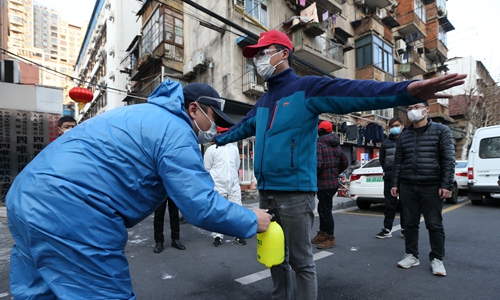HOME >> CHINA
Hubei lockdown exposes chronic issues in logistics
By Zhang Han Source:Global Times Published: 2020/3/13 18:34:34

A community service employee sprays disinfectant on a local resident on Wednesday in Wuhan, Central China's Hubei Province, which is also the epicenter of the COVID-19 outbreak. The city government has launched door-to-door visits of every household and imposed strict quarantine measures in residential communities. Photo: Cui Meng/GT
Some residents in Central China's Hubei Province have complained about high prices and the chaotic delivery of daily necessities amid community lockdowns to curb the spread of COVID-19. The issues have reflected problems that have always existed but have been masked by the epidemic, local residents and community workers said.
Government officials in Xiaogan, a city 70 kilometers north of Wuhan and hard hit by the virus, on Friday vowed to lower the prices of daily necessities after a gathering due to insufficient food supplies was held at a residential community on Thursday night.
A video showing hundreds of people gathered together went viral online, with some netizens who claimed to know the situation saying the group was protesting the community's management office for providing over-priced but low-quality vegetables.
A resident contacted a supplier with lower prices, but the property management office halted the deal and called police, sparking the protest in the community which is home to 8,012 people, according to the Xiaogan government's Sina Weibo account. The community had returned to normal order by 8 pm.
Some netizens also suspected the property management office had been accepting kickbacks from suppliers selling over-priced products.
On Wednesday, the residential committee of a Wuhan community was found to have transported frozen meat allocated by the government in rubbish trucks. Delivered meat was later recalled by local government and destroyed. Two officials have been removed from office and are being investigated, according to Qingshan District authorities.
The complete lockdown policy for residential compounds, aimed at controlling the movement of residents and preventing the spread of COVID-19, was imposed on February 10 in Wuhan and extended to the whole province on February 16.
Logistics difficulties have always existed, but attracted increased attention and became more acute after the urgent need for medical resources was addressed, Wang Lushan, a community worker from Jianghan district in Wuhan, told the Global Times on Friday.
In response to the rubbish truck controversy, Wang explained that communities do not have access to vehicles other than rubbish trucks and small vans. If the meat is provided in large amounts, communities has little ability to coordinate and arrange a proper truck or private cars to transport it. Such coordination relies on the district's government.
Wang's community has more than 100 community workers, grass-roots officials and volunteers responding to over 10,000 residents' demands.
The shortage of hands has been eased and supplies are not as tight as they were a month ago, but some communities have not straightened out their work processes, Wang said.
A Sina Weibo user posted a photo of their trip home by rubbish truck on the day they left the central quarantine center. It's clean inside with steel seats, the user joked, "so what kind of rubbish am I?"
After announcing the complete lockdowns, local government designated suppliers for residential communities, but "the notice came only after many compounds had already built up stable ties with sellers," Wang said, noting the government notice had actually disturbed previous arrangements as some suppliers had to cancel prior orders to supply designated communities.
A Wuhan resident told the Global Times on Sina Weibo that her community had only provided vegetable packages in February at two to three times their normal prices, and frozen meat was added later, but many residents also have demand for fish, fruit and milk.
The community recently began to purchase other necessities for residents, but choices are very limited and prices are high, the resident said.
"We could tolerate this one month ago when patients had no beds, but why should we tolerate it now, after weeks, when distribution should have been clearly sorted out?" the resident complained.
Some residents have made specific requests that may still be challenging to acquire, such as a special brand of millet. Wang believes this shows people now have the time to think about their quality of life and that the general mood is improving as the epidemic appears to have come under control.
Five new infections were reported in Wuhan on Friday, also the total number domestically. Three imported cases were reported in Beijing and Shanghai.
Conflicts are more likely to break out in communities where property managers had little or no communication with residents before the outbreak. The long-term quarantine has also made many anxious and emotional, Wang said.
RELATED ARTICLES:
Posted in: SOCIETY